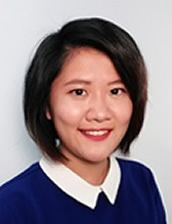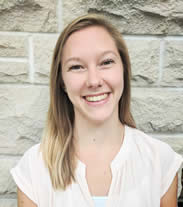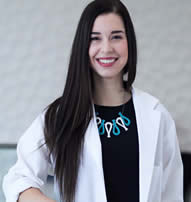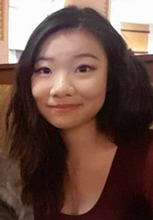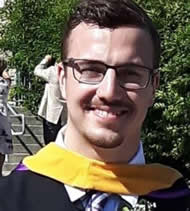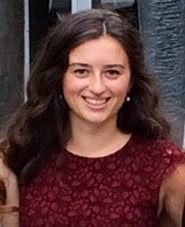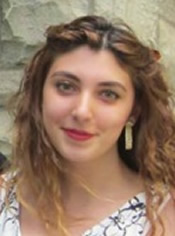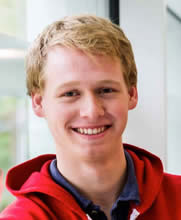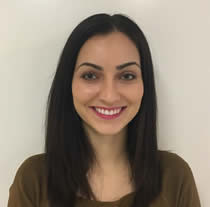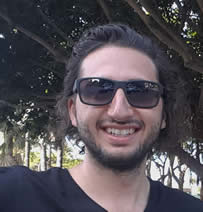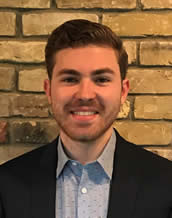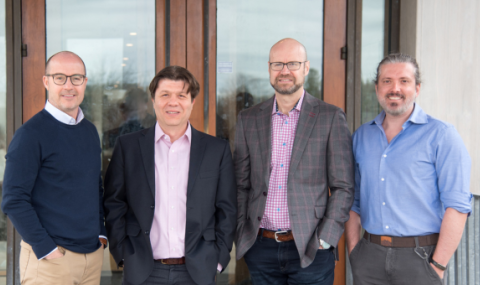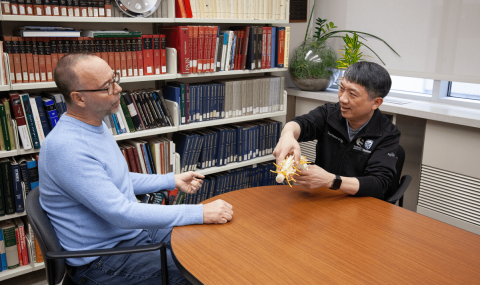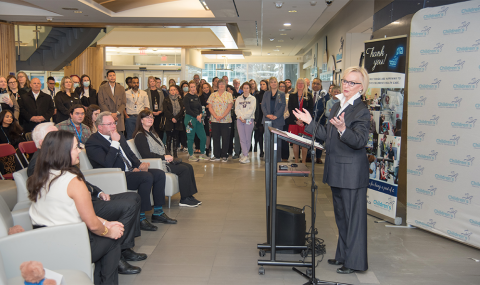Oi Wai Chau (April) is an MSc student in the Department of Medical Biophysics, under the supervision of Dr. Stewart Gaede. She is working on assessing the acute cardiac inflammation after left-side breast cancer radiotherapy with hybrid PET/MRI. By correlating the regional radiation dose deposition to the inflammatory reponse and other believed precursors to radiation induced cardiac disease, the results will assist in treatment strategies designed to minimize cardiac damage during radiation therapy of the breast. |
|
Veronica Dubois is an MSc student in the Department of Medical Biophysics, under the co-supervision of Drs. John Ronald and Paula Foster. She is working on developing molecular imaging techniques for chimeric antigen receptor (CAR) T cells, a cancer cell therapy that finds and kills cancer after injection into the body. This technique is based on reporter genes which allow the CAR-T cells to be tracked over time using MRI and bioluminescence imaging. The ability to monitor CAR-T cells during treatment will lead to a better understanding of how to develop and improve CAR-T cell therapy effectiveness and safety for patients with breast cancer. |
|
Natasha Knier is an MSc student in the Department of Medical Biophysics, under the supervision of Dr. Paula Foster. Many investigators examining the spread of breast cancer use mice, called mouse ‘models’ of cancer, with cancer cells that are grown in a dish under artificial conditions. These have been very useful but do not represent real patient tumours very well. Recently, new types of models have been developed which use human tumours passaged directly in mice, called patient derived xenograft (PDX) models. Natasha's project focuses on studying breast cancer that spreads to the brain using PDX models and using a special magnetic resonance imaging (MRI) technique to see which cells that spread to the brain die, which form new tumours, and which cells do not form tumours, but remain within the brain. |
|
| Muhan Liu (Violet) is an M.Sc. student in the Department of Biochemistry working under the supervision of Dr. Eva Turley. Her research project concerns with investigating a novel prophylactic against breast and non-melanoma skin cancers. A topical epidermal-penetrating cream containing modified hyaluronan - a polysaccharide implicated in preventing both breast and skin cancer initiation - was developed in the Turley Lab. Upon application of the topical cream, susceptible mice showed a significant decrease in UV-induced tumors. Her goal is to identify the mechanism of hyaluronan-mediated tumor resistance and translate the experimental findings to reduce breast cancer initiation, thereby reducing the mortality and morbidity rates associated with breast cancer. | |
Braeden Medeiros is an MSc student in the department of Anatomy and Cell Biology, under the supervision of Dr. Alison Allan. The aim of his research is to assess how breast cancer molecular subtype influences the ability of the lung to produce/attract specific factors that support breast cancer metastasis. The goals of this project are to identify when, why, and how lung metastasis develops in a subtype-specific manner. The resulting data could facilitate improved clinical management, including earlier detection, treatment, and/or prevention of metastasis. |
|
Olivia Sehl is an MSc student in the Department of Medical Biophysics, under the supervision of Dr. Paula Foster. We study the immune cells, called macrophages, that help breast cancer grow and spread. These cells can be seen with magnetic resonance imaging (MRI) when they ingest contrast agents. We hope that imaging macrophages can help us identify breast cancer and its metastases to improve patient diagnosis and treatment plans. |
|
Olivia Tong is an MESc student in the Department of Biomedical Engineering, under the supervision of Drs. Jeffrey Carson and Mamadou Diop. Dr. Carson's group is developing a non-contact scanner that can accurately monitor the blood oxygen level inside the tumours during chemotherapy. She is working on a component of this non-contact scanner that can capture the 3D shape of the breast. The results from this project will lead to a new diagnostic method that will direct patients to the most appropriate treatment for breast cancer as early as possible, and thereby reduce the risk of cancer coming back or spreading to other regions. |
|
Nivin Nystrom is a PhD student in the Department of Medical Biophysics under the supervision of Dr. Timothy Scholl and Dr. John Ronald. Her work focuses on developing a novel imaging technique for the development of cellular immunotherapies targeted towards Her2-positive breast cancers that have metastasized to the brain. For cancer patients, cellular immunotherapies work by "training" the patient's immune cells to recognize and respond to their cancer outside of the patient's body, and then re-introducing these newly trained immune cells into the patient's body to attack the cancer. It is particularly difficult to measure important parameters within the patient's body, such as whether these newly trained immune cells are getting to the cancer site and activating in response to the cancer, and/or if they are mistakenly attacking other parts of the patient's body. To study this, Nivin is incorporating an imaging regimen during the training phase of these immune cells, such that these newly trained immune cells can now be tracked on magnetic resonance imaging (MRI) to study where they go within the body, and where they are activating. |
|
Owen Hovey is a Ph.D. student in the Department of Biochemistry, under the supervision of Dr. Shawn Li. Breast cancer cells can spread to other parts of the body, primarily lungs and bones, and this migration is known as metastasis. The Li lab previously identified three peptide inhibitors which affect the "P-switch" and prevent the migration of a breast cancer cell line. This "P-switch" pathway will be confirmed by patient biopsy samples, to establish clinical relevance. Our project aims to understand the "P-switch" further and create inhibitors to target the "P-switch" pathway to prevent the metastasis of breast cancer cells. |
|
Milica Krstic is a PhD student in the Department of Pathology and Laboratory Medicine, under the supervision of Dr. Alan Tuck and Dr. Ann Chambers. Her research focuses on mechanisms of breast cancer progression, with a focus on regulation of gene expression by variants of the TBX3 protein. Through the mining of biomarkers by genomic and immunohistochemical methods, Milica has identified up-regulation of particular proteins in tumors of several patients with early stage disease. This information may be used to stratify patients into risk groups, and separate those with indolent lesions from those that have a higher chance of developing deadly cancers. |
|
Matthew Mouawad is a PhD Student in the Department of Medical Biophysics, under the supervision of Dr. Stewart Gaede and Dr. Neil Gelman. His work will contribute to the continued development of a proposed new treatment plan that aims to treat early stage breast cancer patients with 1-3 fractions of radiation instead of the traditional treatment scheme (25 fractions over 5 weeks). This new treatment technique will significantly reduce the emotional burden on patients and increase the quality of life. His portion of the project involves using images acquired from the first hybrid PET/MRI in Canada to assess treatment response to the radiotherapy, as well as investigate better ways to treat patients in this setting. This research will lead to the development of tools to help clinicians to tailor treatment regiments to individual patients. |
|
Vy Ngo is a PhD student in the Department of Pathology and Laboratory Medicine, under the supervision of Dr. Martin Duennwald. She is investigating mechanisms of therapy resistance in breast cancer and designing a novel approach using small molecules to enhance the efficacy of cancer therapeutics. Cancer cells that survive initial treatment often metastasize to other parts of the body, thereby posing a unique clinical challenge. Her approach may serve as a new treatment strategy for therapy-resistant breast cancer and metastasis. |
|
Nathan Orlando is a PhD-MClSc (CAMPEP) student in the Department of Medical Biophysics, under the supervision of Dr. Aaron Fenster. His research focuses on developing a guidance system for permanent breast seed implantation, an alternative form of radiation therapy where radioactive “seeds” are implanted directly into the breast to reduce treatment time to a single session. Breast-conserving therapy, the standard of care for early-stage breast cancer, often involves lengthy radiation therapy. This lengthy therapy may cause some patients, especially those with high travel times to the treatment site, to instead choose mastectomy or even forgo radiation completely. By developing a 3D ultrasound guidance system, they hope to make this alternative treatment more viable for widespread use, increasing access to breast-conserving therapy for rural patients. |
|
Lawrence Yip is a PhD student in the Department of Medical Biophysics, under the supervision of Dr. Jeffrey Carson. He is working on developing a photoacoustic Tomography system, which is a hybrid imaging system combining the advantages of ultrasound and optical imaging. With this system, he hopes to help guide surgeons during breast-conserving surgery to more accurately remove tumourous tissue and reduce repeat surgeries. |


